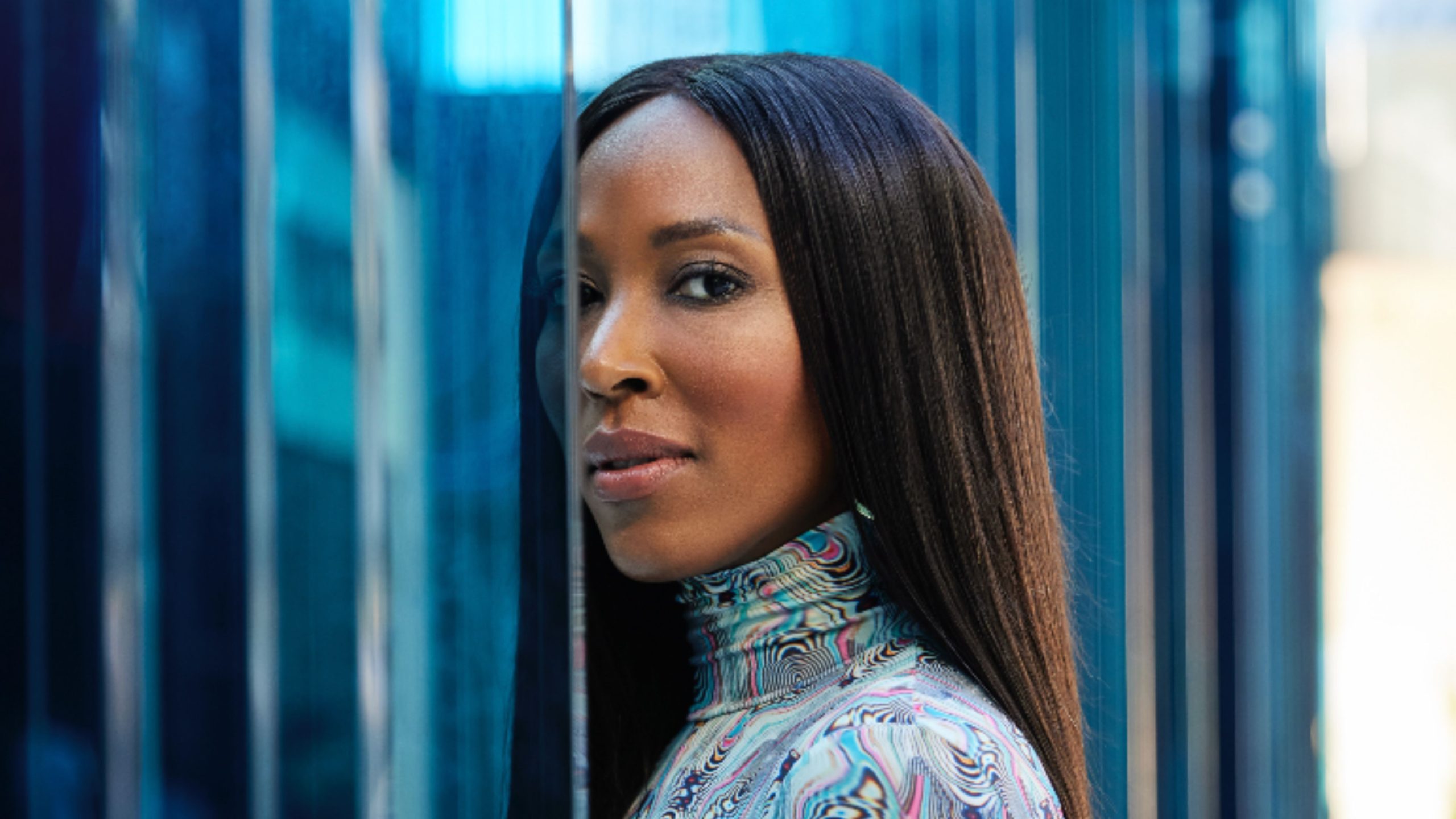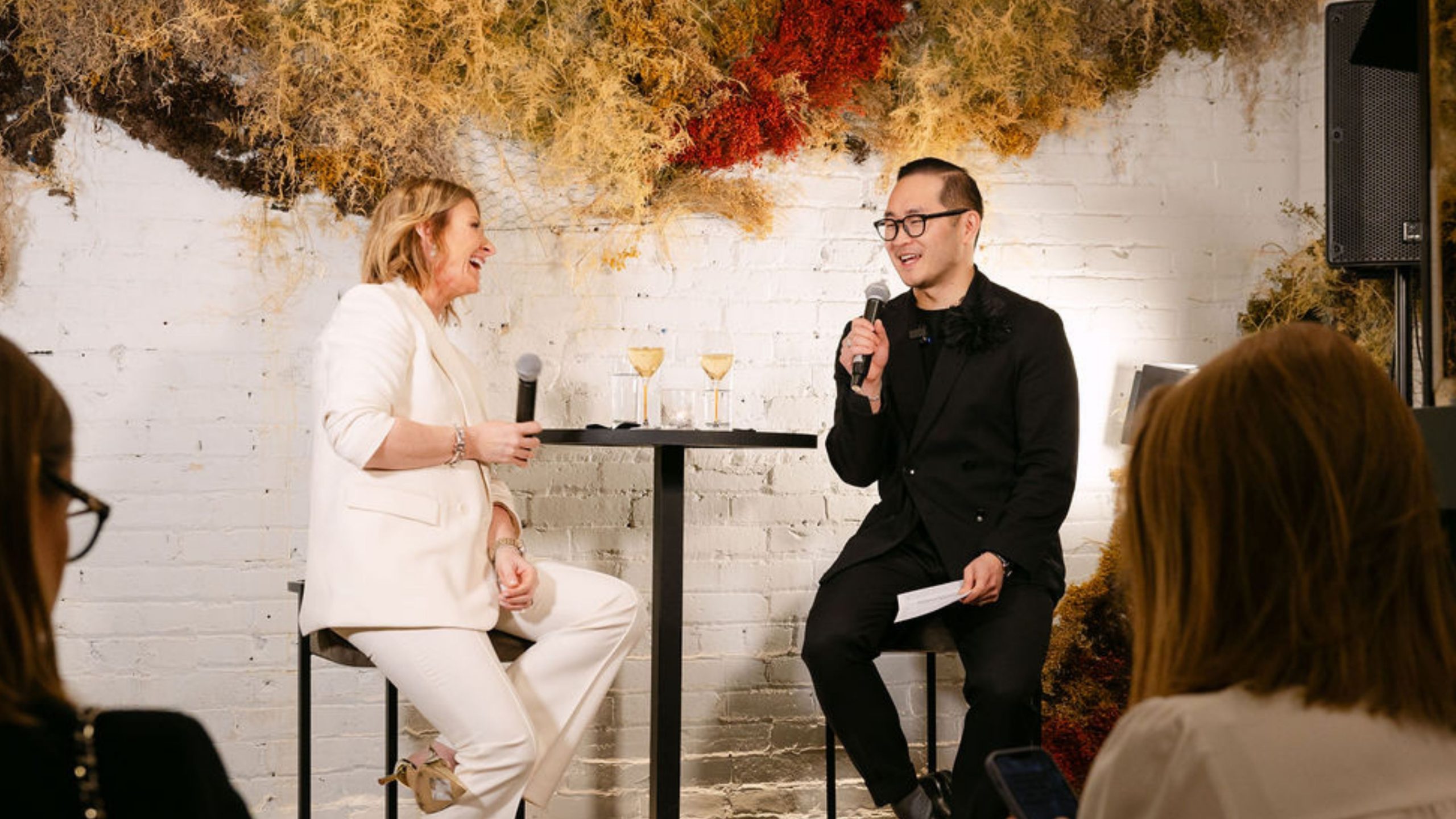The Creators is an editorial series presented by Glory Professional that focuses on the career paths, strategies, and tactical advice of today’s most compelling social media entrepreneurs.
Sasha Exeter is not new to content creation, having started her career in 2012 after a life-altering event. Bedridden and facing the unwelcome redirection of her life, Exeter began her blog as a creative outlet. Once her health was back on track and she had returned to the corporate world she was forced to leave behind, she realized that her heart wanted something else, something more. Despite the accidental nature of her career change, Exeter decided to switch to full-time content creation and has been successfully paving the way for female content creators for over 10 years.


What kind of content do you create?
Sasha Exeter: I think most people would categorize me as a lifestyle creator. My content has changed so much over the years [but] focused a lot more on fashion in the very beginning. As I grew, my content became less about fashion trends and more about fitness, health, and wellness. But when I approached my late thirties and became a mother, being the type of creator I am, my motherhood journey became a big part of the narrative. I seem to have done a full circle and have come back to fashion. Even though I have a daughter, I always knew I never wanted being a mother to define who I was online or to be labelled a “mom blogger.” I am so many things and I just want my content to reflect all of that. [Now,] what you’ll find is a carefully curated mix of travel, fashion, fitness, and lifestyle.
What is your unique perspective on your niche?
Sasha Exeter: Being a Black creator over the age of 40 is a niche in itself, but I think the uniqueness really comes from being multifaceted and having very specific brand pillars when it comes to my content. Many of my other counterparts fall into one category, however I like to think that my online community gets a regular mix of travel, fashion, fitness, and lifestyle from the lens of a busy entrepreneur and single mama.
How do you define influence?
Sasha Exeter: Having influence essentially means someone has the capacity to affect or change someone or something in an indirect, but important, way. I often find that the term is thrown around so loosely in this industry though. In social media, anyone can go online to share content and promote a product or service. That’s the easy part. But what sets a content creator apart from the rest is whether they can influence someone’s purchasing decisions. Can they convert and sell products or services of their own or for a client? Can they inspire others to make meaningful changes in their lives? That’s real influence, not just posting sponsored content on different platforms.
Do you take issue with the term ‘influencer?’
Sasha Exeter: Well, yes. I really detest the world ‘influencer’ and I dislike being referred to one. I do my best to try to reinforce and prioritize the term ‘Content Creator’ when I speak about what I do or when I am featured in things. I am not quite sure what my true issue is with the world, in all honesty. Perhaps it’s because outside the landscape of social media, it has a negative connotation to it and people just naturally assume that an influencer is simply someone that goes to pretty coffee shops, shares a skincare routine nobody asked for, and runs around the city all day taking iPhone photos. Let me just point out, if that’s what some do, there is nothing wrong with it but I know the amount of time and work our team puts into what we create for my content, my co-designed projects, in addition to what we produce for our clients.
I also do other things. Produce, product development, consult, and now host a podcast. For me, the term ‘influencer’ seems a bit limiting. I do know this much, influencing is more of a byproduct and a result of a content creator or brand storyteller doing their job well. This is typically achieved when someone has gained trust from their online community through content that is honest, authentic, and engaging.
How long did it take the jump to full-time influencing?
Sasha Exeter: It took about a good year and a half before I took the leap. I am a creature of habit and comfort so I was obviously worried being able to match the income [and security] I was making in my corporate job at first. Honestly, I was really worried about what my parents were going to think. They both immigrated to Canada and worked so hard to build a life that would afford me the opportunities they never had and naturally, they were a bit concerned when I told them about my change of direction. Now they are so proud of what I have accomplished.
What is a tactic that you employ to maintain an engaged and loyal audience?
Sasha Exeter: Loyalty from my audience 100 percent comes from being transparent, honest, and authentic. I humanize myself by not only posting the highlights of my life. I share the hard, challenging, and shitty moments as well because my life (like everyone else’s) is far from perfect. With that comes trust, which is the most important part of this whole game. Trust and loyalty are what help you influence other people. I am also very purposeful when it comes to the brand partners I align with.
In the beginning, many years ago, I would say yes to partnerships without even trying a product. I want to cringe thinking about that now. Huge mistake! There have been times where I ended up not liking a product at all but was contractually bound to promote it. And you know what? People can totally see through the bullshit. I felt so uncomfortable posting it, knowing I wasn’t entirely being truthful.
Eight years ago, I made sure that if I was not already using and loving a brand’s product, I would have to test and trial things out before saying yes and signing a contract. It also makes my life a whole lot easier. When you love and believe in the products you’re speaking to, it makes creating the content, writing copy, and promoting a whole lot easier.
There is a lot of talk about the algorithm. How do you update yourself on changes?
Sasha Exeter: Can I just tell you, the algorithm haunts me at night. I try not to let it get to me too much because it’s out of my control but it’s so hard not to when you invest so much time and energy into creating. Our team analyzes metrics weekly now since the algorithm changes so often, and we use a handful of different external platforms outside of Instagram to delve into the data.
I also follow Adam Mosseri‘s (Head of Instagram) posts very closely and often engage with him in DMs. Whenever a new announcement is made about a new feature or changes, we just expect the algorithm to switch or change and brace ourselves for impact. I think like everyone else, I stay abreast by following tech accounts on Instagram and TikTok for updates.
Do you utilize a content calendar?
Sasha Exeter: I don’t think we would survive without a content calendar. We are not doing anything revolutionary. It’s just a simple, shared Google doc calendar where we input key calendar moments, important national and international dates and holidays, our sponcon (for both stories and in-feed), press trips, events where content output is required, etc. We also make space for organic content. It is important for my social channels to have a healthy balance between sponsored and organic content.
What are three underrated tools you use to create, plan, distribute, or monitor your content that you swear by?
Sasha Exeter: I am very basic with my app tools but my team’s digital manager uses a few different things like Dash Hudson to monitor analytics. It’s crazy but I have three iPhones that come in handy if you want to shoot video clips from different angles on a tripod simultaneously. I love a good tripod. I have about five to six right now and can’t travel without at least one. I’m currently obsessed with the Atumtek extendable phone tripod. It’s very sturdy and compact making it easy for traveling. Our videographers use SLRs primarily but when I am shooting my own video content, I like to film in Filmic Pro, which is a third-party app. The camera and resolution are super high quality.
I feel so lucky and blessed to have such an amazing photographer, David Pike, who is also the brand’s Co-Creative Director. I don’t need many editing tools because he is a genius, but if I need some simple edits on the go for iPhone photos, I do quite a bit of editing right with my iPhone and use Snapseed, Adobe Lightroom, Spark, and Splice. I like to stay away from apps that distribute content, but I do plan how it will look in my feed prior to posting and we use the UNUM app for that.
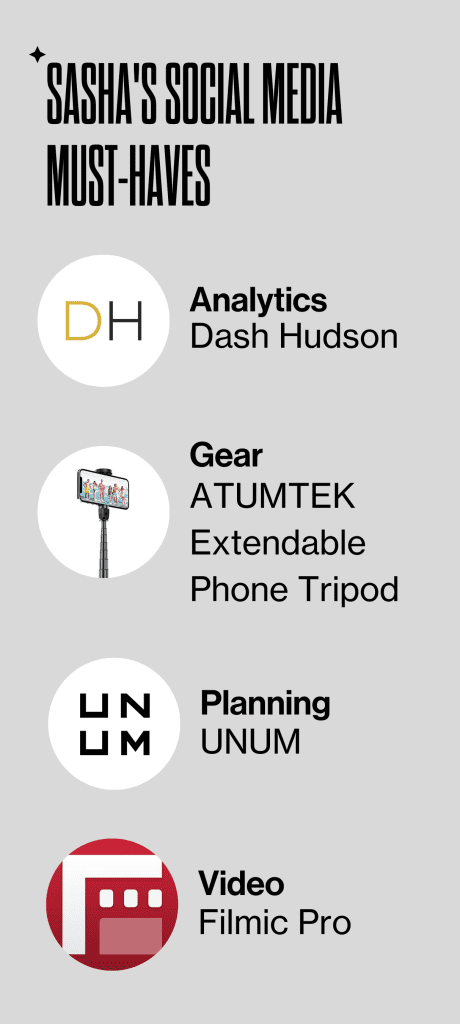

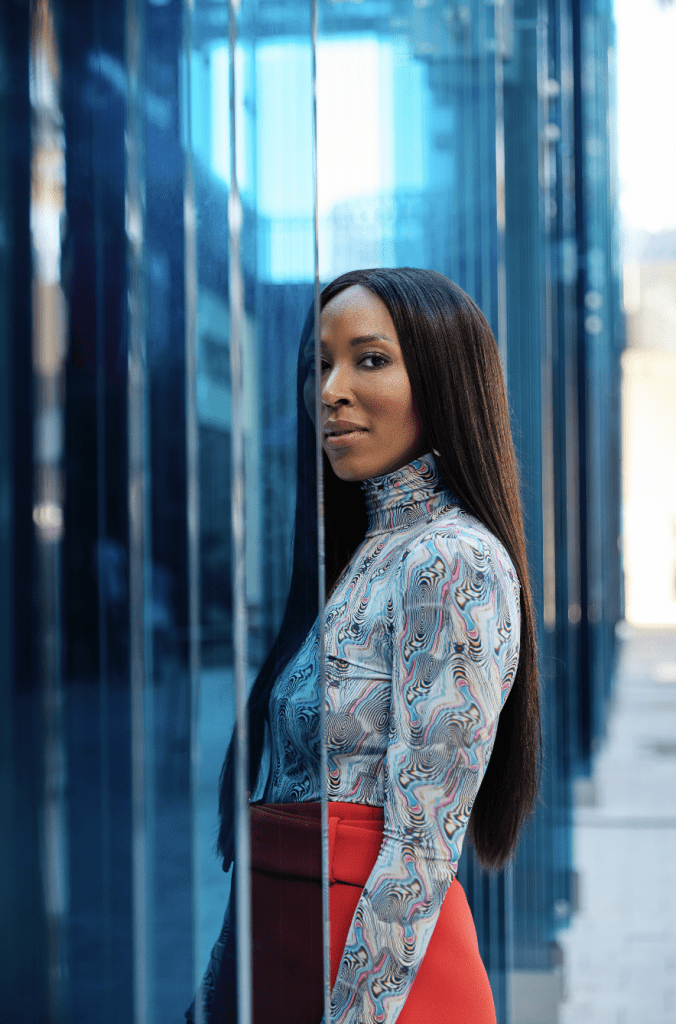

What is something that most people get wrong when it comes to their social media strategy?
Sasha Exeter: Not having a strategy [laughs]. There are people that don’t have one or worse, their strategy is just to follow what’s trending and going viral. I think the biggest mistake people make is not establishing clear objectives and goals. Without them, you have no way to measure your success and ROI. A social media strategy should be SMART: Specific, Measurable, Attainable, Relevant, and Time-bound.
How do you handle online criticism?
Sasha Exeter: How much time do we have? Online criticism and trolling is one of the toughest parts of this job. Putting your life out there for everyone to see means you are opening yourself up to feedback of any kind. When you’re a micro-influencer, things are a bit easier I feel. It’s like you are in a safe space with a tight-knit community that feels like an extended family. There are very few negative comments or trolling unless the creator does something that doesn’t land well.
But when you grow, achieve a large audience, or get notoriety, the ballgame totally changes. You end up getting hate followers and there’s a high probability of trolling. You’re under a microscope essentially and your responsibility on the platform also changes.
I only started to encounter bullies and trolls two years ago. It was not something that I was used to until I was involved in something that made international news. I still have PTSD from it, if I can be honest. It was very intense. [There were] racist comments, death threats, and at times, very detailed messages and comments about how they plan to inflect bodily harm. Basically, it was harassment.
It’s extremely polarizing and, at that level, it’s not anything someone can prepare you for. I have several different tactics to handle and address them. I used to ignore all of them and never responded or blocked accounts. That was advice early on that I got, which turned out to not be the best bit of guidance. It was impossible to ignore and not read them, which took a toll on my mental health. They never really went away.
Now, I do things differently. Sometimes I ignore, sometimes I respond back, even with just a question asking for more insight into their comment. I often reply by sending positive energy back to the person, who usually is hurting or angry and bullying as a result. They usually bounce after that or even apologize. When shit gets out of hand, I am not afraid to block and report accounts now. It’s my account and my mental health at the end of the day.
How do you advocate for yourself in partnership negotiations?
Sasha Exeter: I have learned so much over the years and understand my worth, so I never let a brand, client, or agency determine what that is. My rates are my rates because, one, I know I have a highly engaged audience that trusts me, and I have a proven track record for converting. Two, our team puts in the same quality of work (campaign standard) with everything we work on. As they say, how you do one thing is how you do everything. And three, I know what content my audience wants to see and what performs well. I always put together a scope of work for clients. I don’t find it beneficial when they approach creators with a one size fits all scope of work and it’s not tailored to individual creators.
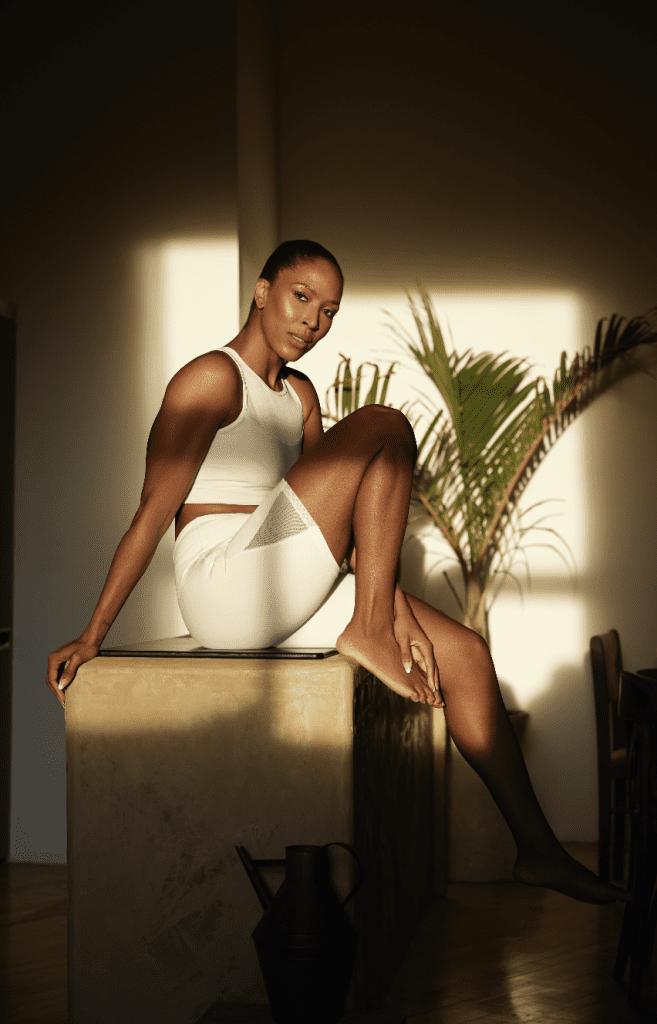

What is the best partnership you’ve experienced?
Sasha Exeter: Publicly choosing a favourite is risky business [laughs]. The best partnerships I have been in are with brands who truly see me for who I am, want to grow with me, empower me, have trust in me, respect and listen to my evidence and analytics-based recommendations and feedback. They understand the true meaning of partnership and respect my intellectual property. Most importantly, they pay me fairly for the work I do. Caudalie is an excellent example of a good client partner and partnership.
What is the worst partnership you’ve experienced?
Sasha Exeter: You would be so surprised if you knew what truly goes on behind-the-scenes. I could write a book. There have been a few to date but I am a professional so nobody would be the wiser. I will refrain from any specific names but it’s never a good partnership when a client doesn’t truly act as a partner. Using a content creator campaign puzzle template that only looks to use me as a piece to an existing puzzle, and not creating something together that works for all parties involved… I mean, I can speak ad nauseam about this—having ideas stolen, having to take legal action, not being paid in a timely manner, or require something and not having the budget to pay for it. For the most part, I have been lucky with long-time brand partners but sometimes things aren’t always what they seem.
What is the key to work-life balance as a content creator?
Sasha Exeter Creating boundaries is key. Although this work is not designed to be nine-to-five, it is important to create space for breaks and rest. I had to learn this the hard way for my mental and physical health. It’s not good to always be “on.” It’s just not sustainable. I personally like to shut my phone down by 10PM and don’t work on weekends anymore. I work long hours during the week, so I need that time to decompress, rest, and spend time with my kid. Also, taking periodic breaks during the year is helpful in avoiding burnout. It’s much easier said than done but, in my experience, it allows me to recharge and be more creative.
What is a lesson that brands and businesses can learn from content creators?
Sasha Exeter: I think brands have to remember why they hire a content creator. They usually select them for a reason—the quality of their work and expertise. They should 100 percent value that, their opinions and feedback, and work in tandem to make bespoke campaigns that work for both the brand and creator.
Why should influencers be a part of every CMO’s marketing strategy?
Sasha Exeter: Content creators are a huge value to a marketing strategy primarily because their online communities trust the recommendations made by their favourite people to follow online. Significantly more than a celebrity endorsing a brand, they are much more likely to influence purchasing decisions, drive more people to a company’s products or services, ultimately resulting in high conversion rates.
What has been your biggest brand deal?
Sasha Exeter: Without a doubt, Joe Fresh. The size and scale of the partnership, how much it grew over seven years and having created five co-designed collections in under three years was a huge accomplishment.
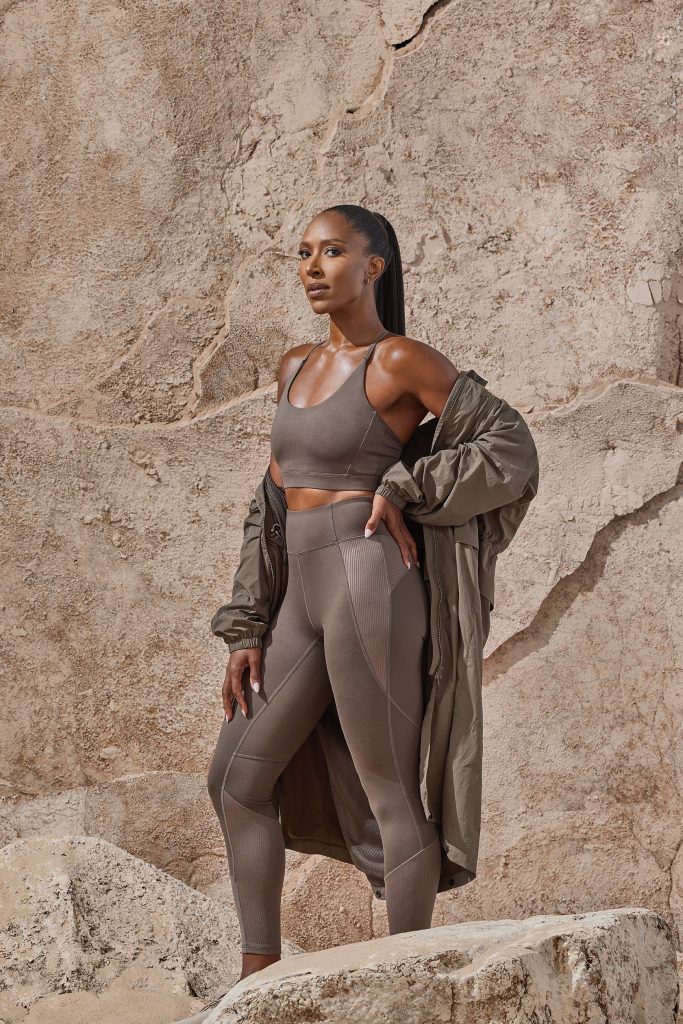

What is your biggest professional milestone?
Sasha Exeter: This is a tough one. I am so blessed to have had some pretty amazing accomplishments to date. Having created so many successful collections with Joe Fresh, having my very first hand bag with Ela Handbags completely sell out in two-and-a-half minutes, and having my own Tetley Tea, the first-ever co-designed tea for the brand, was a pretty big deal.
Who is an influencer in your direct community that inspires you?
Sasha Exeter: Hannah Bronfman. I don’t find many women my age in this space that are multifaceted. She’s a woman of colour and wears many hats: entrepreneur, content creator, brand storyteller, angel investor, business owner, mama. Hannah uses her voice for good and for change, and does it all with such grace.
What is your biggest hope for the influencer industry in 2023?
Sasha Exeter: I hope that brands continue to make and save space for BIPOC creators. Things seem to slowly be reverting to the way they were pre-pandemic, where the big opportunities and contracts are reserved for White content creators. I would love to see Canadian and global brands partner with more Black, Asian, and Indigenous talent year-round and not only during key moments throughout the year.
I would also really like to see more collaboration and sharing amongst my counterparts. Less gatekeeping. We are stronger together and I would like to see more open discussions around rates and less undercutting, so there is more of an even playing field for everyone in the game.


